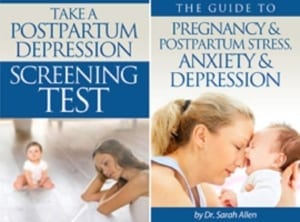What should I do if I think I am experiencing a mood disorder while pregnant or after having a baby?
- Call your medical provider. Below you can learn how to find someone with relevant experience.
- Call a therapist who specializes in treating pregnant or postpartum women.
- Contact the Postpartum Depression Alliance of IL at Email Support or 847 205-4455 (a helpline volunteer will email or call you back within 24 hrs) for support and information.
- Ask friends or family for help so you can take breaks.
- Tell someone how you feel and find someone you trust that can help you.
- If you feel that you need immediate care, call NorthShore University HealthSystem 1-866-364-MOMS hotline, your local hospital, 911 or 1-800- SUICIDE.
If you are a woman experiencing any of the feelings mentioned on the Symptoms Page, or if you are observing these signs in a friend or family member, contact a health care provider. A complete medical evaluation, including thyroid screening, is necessary as under or overactive thyroid and other diseases can mimic depression or anxiety symptoms.
Most women suffering from perinatal (another name for pregnancy & postpartum) mood disorders realize that something is wrong, but often do not seek help. The important thing to remember is that the symptoms are temporary and treatable with skilled professional care and social support.
It is important to remember that you are not alone, it is not your fault and with help, you will recover!

- Call your medical provider. Below you can learn how to find someone with relevant experience.
- Call a therapist who specializes in treating pregnant or postpartum women.
- Contact the Postpartum Depression Alliance of IL at Email Support or 847 205-4455 (a helpline volunteer will email or call you back within 24 hrs) for support and information.
- Ask friends or family for help so you can take breaks.
- Tell someone how you feel and find someone you trust that can help you.
- If you feel that you need immediate care, call NorthShore University HealthSystem 1-866-364-MOMS hotline, your local hospital, 911 or 1-800- SUICIDE.
If you are a woman experiencing any of the feelings mentioned on the Symptoms Page, or if you are observing these signs in a friend or family member, contact a health care provider. A complete medical evaluation, including thyroid screening, is necessary as under or overactive thyroid and other diseases can mimic depression or anxiety symptoms.
Most women suffering from perinatal (another name for pregnancy & postpartum) mood disorders realize that something is wrong, but often do not seek help. The important thing to remember is that the symptoms are temporary and treatable with skilled professional care and social support.
It is important to remember that you are not alone, it is not your fault and with help, you will recover!
How should I choose a Mental Health Provider?
You may want to ask a mental health provider the following questions. Good professionals will not mind taking time to talk to you about their experience and level of expertise.
Anyone can set themselves up to be an expert. These are some questions to ask when you call a mental health provider:
What specific training have you received in diagnosing and treating perinatal mood disorders?
Professionals who have specialist skills workng with perinatal mood disorders will have attended many conferences and workshops and have likely presented at them and published research. Attending one or two short workshops or a webinar does not make someone an expert.
How many years have you been treating women with pregnancy and postpartum mood disorders?
How many women have you treated who are experiencing similar symptoms to me?
Specialists will have treated over 50 women and have over 5 years of clinical experience. If you live in an area that doesn’t have providers with perinatal experience ask them whether they are willing to seek consultation from providers with more experience.
Are you a Licensed Psychologist, Clinical Social Worker or Clinical Professional Counselor?
Make sure you see someone who is fully licensed which means on top of their training, they have had (depending on license) between 1700 – 3500 hours of supervised patient hours. Licensed mental health professionals are Psychologists PsyD, Licensed Clinical Professional Counselors, L.C.P.C., or Licensed Clinical Social Worlers L.C.S.W. In Illinois, if someone only has 3 letters after their name i.e. L.P.C. or L.S.W, it means they are still under supervision and no matter what they claim on their website, they are not specialists. Treatment takes less time when the therapist is fully licensed and highly experienced.
Do you belong to any organization that educates its members about PPD?
The main organization in the USA is Postpartum Support International.
What type of psychotherapy are you trained in?
Types of Therapy for Postpartum Mood Disorders
Cognitive-Behavioral Therapy (CBT)
Cognitive behavioral therapy (CBT) is a proven and effective treatment for postpartum mood disorders. It focuses on the link between thoughts, feelings, and behaviors, giving new mothers strategies to change negative thinking and adopt positive behaviors. CBT provides a comprehensive approach to supporting maternal mental health after childbirth.
Interpersonal Therapy (IPT)
IPT is another therapy form that centers on the personal relationships of the new mother, recognizing that postpartum mood disorders often affect and are affected by the social and interpersonal context of a woman’s life. It addresses issues related to the role transition of being a mother, encourages useful communication patterns, and fosters stronger connections with significant others.
Support Groups
Joining a support group can also be incredibly helpful in navigating postpartum mood disorders. Sharing experiences, fears, and triumphs with other mothers who understand what you’re going through can provide comfort and validation. Support groups offer a strong sense of community and reduce feelings of isolation, which can be crucial for new mothers with limited support.
Studies have shown that cognitive-behavioral therapy (CBT) and interpersonal therapy (IP) work best in treating PPD. CBT can help you identify and change inaccurate perceptions of yourself and the world around you, while IP focuses on how you behave and interact with family, friends, and other people in your life. Long-term psychoanalysis, which may continue over many months or even years, is usually not the best approach for PPD.
Source: MedED PPD supported by NIMH & IDFPR
What self-help will help me feel better?
- Support and reliable information about getting through depression and anxiety
- Good nutrition and eating every three hours to keep your blood sugar in balance
- Rest and breaks from childcare
- Therapy and/or medicine from a trusted healthcare provider
- Fresh air and movement getting out of the house
- Practical help with chores
- Talking to other women and families who have been through it and recovered

What kind of treatment will help?
Perinatal mood disorders (PPMDs) can be successfully treated with medications, psychotherapy, or a combination of both. There are several types of psychotherapy that have been shown to be effective for depression including Cognitive-behavioral therapy (CBT) and interpersonal therapy (IPT ) have been shown as the most effective types of therapy for PPMD. Research has shown that mild to moderate depression can often be treated successfully with either approach alone.
Severe depression may be best treated with a combination of psychotherapy and medication. Medication is especially appropriate in patients with more severe or chronic symptoms, prior episodes or family histories, or who have done well with medication in the past.


